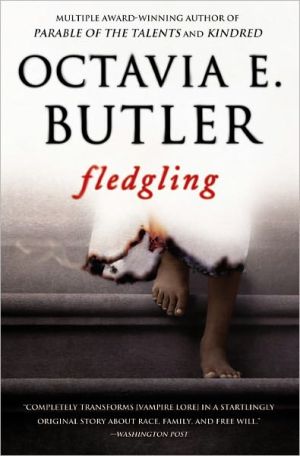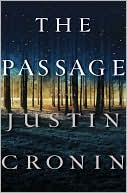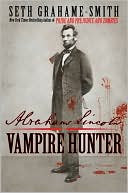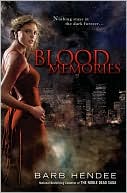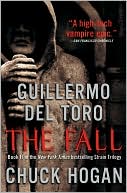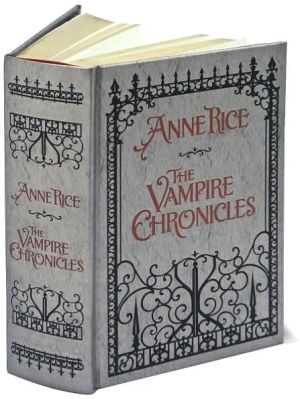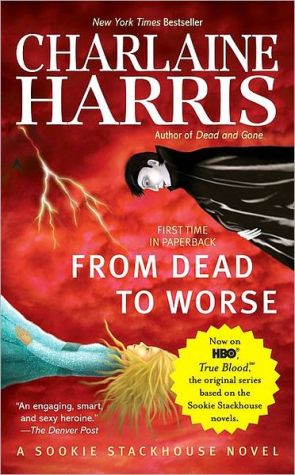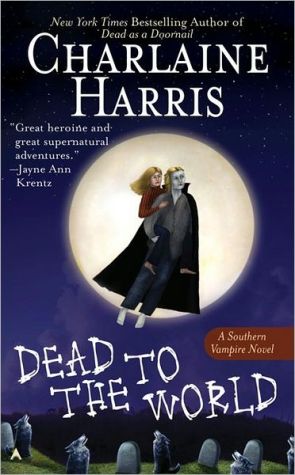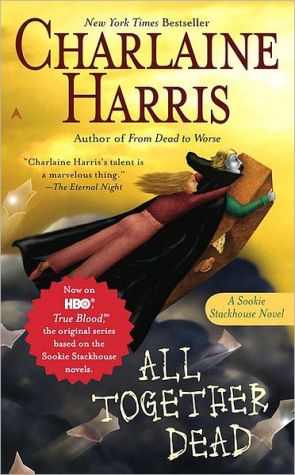Fledgling
Octavia E. Butler is one of the finest voices in fiction—period. . . . A master storyteller, Butler casts an unflinching eye on racism, sexism, poverty, and ignorance and lets the reader see the terror and beauty of human nature.-"The Washington Post Book World "Readers familiar with . . . "Parable of the Sower and "Bloodchild will recall that [Butler] never asks easy questions or settles for easy answers."-Gerald Jonas in "The New York Times "Fledgling, Octavia Butler's first new novel in...
Search in google:
Best-selling and nationally acclaimed author Octavia Butler puts a new spin on the vampire novelThe Washington Post - Ron CharlesHow many of our happy relationships involve a degree of dominance or dependence that we can't acknowledge? This is Butler's typically insidious method: to create an alternative social world that seems, at first, alien and then to force us to consider the nature of our own lives with a new, anxious eye. It's a pain in the neck, but impossible to resist.
Fledgling\ \ By Octavia E. Butler \ WARNER BOOKS\ Copyright © 2005 Octavia E. Butler\ All right reserved.\ ISBN: 0-446-69616-1 \ \ \ Chapter One\ I awoke to darkness. \ I was hungry-starving!-and I was in pain. There was nothing in my world but hunger and pain, no other people, no other time, no other feelings. I was lying on something hard and uneven, and it hurt me. One side of me was hot, burning. I tried to drag myself away from the heat source, whatever it was, moving slowly, feeling my way until I found coolness, smoothness, less pain.\ It hurt to move. It hurt even to breathe. My head pounded and throbbed, and I held it between my hands, whimpering. The sound of my voice, even the touch of my hands seemed to make the pain worse. In two places my head felt crusty and lumpy and ... almost soft. And I was so hungry.\ The hunger was a violent twisting inside me. I curled my empty, wounded body tightly, knees against chest, and whimpered in pain. I clutched at whatever I was lying on. After a time, I came to understand, to remember, that what I was lying on should have been a bed. I remembered little by little what a bed was. My hands were grasping not at a mattress, not at pillows, sheets, or blankets, but at things that I didn't recognize, at first. Hardness, powder, something light and brittle. Gradually, I understood that I must be lying on the ground-on stone, earth, and perhaps dry leaves.\ The worst was, no matter where I looked, there was no hint of light. I couldn't see my own hands as I held them up in front of me.Was it so dark, then? Or was there something wrong with my eyes? Was I blind?\ I lay in the dark, trembling. What if I were blind? Then I heard something coming toward me, something large and noisy, some animal. I couldn't see it, but after a moment, I could smell it. It smelled ... not exactly good, but at least edible. Starved as I was, I was in no condition to hunt. I lay trembling and whimpering as the pain of my hunger grew and eclipsed everything.\ It seemed that I should be able to locate the creature by the noise it was making. Then, if it wasn't frightened off by the noise I was making, maybe I could catch it and kill it and eat it.\ Or maybe not. I tried to get up, fell back, groaning, discovering all over again how badly every part of my body hurt. I lay still, trying to keep quiet, trying to relax my body and not tremble. And the creature wandered closer. I waited. I knew I couldn't chase it, but if it came close enough, I might really be able to get my hands on it.\ After what seemed a long time, it found me. It came to me like a tame thing, and I lay almost out of control, trembling and gasping, and thinking only, food! So much food. It touched my face, my wrist, my throat, causing me pain somehow each time it touched me and making noises of its own.\ The pain of my hunger won over all my other pain. I discovered that I was strong in spite of all the things that were wrong with me. I seized the animal. It fought me, tore at me, struggled to escape, but I had it. I clung to it, rode it, found its throat, tasted its blood, smelled its terror. I tore at its throat with my teeth until it collapsed. Then, at last, I fed, gorged myself on the fresh meat that I needed.\ I ate as much meat as I could. Then, my hunger sated and my pain dulled, I slept alongside what remained of my prey.\ When I awoke, my darkness had begun to give way. I could see light again, and I could see blurred shadowy shapes that blocked the light. I didn't know what the shapes were, but I could see them. I began to believe then that my eyes had been injured somehow, but that they were healing. After a while there was too much light. It burned not only my eyes, but my skin.\ I turned away from the light, dragged myself and my prey farther into the cool dimness that seemed to be so close to me, but took so much effort to reach. When I had gone far enough to escape the light, I fed again, slept again, awoke, and fed. I lost count of the number of times I did this. But after a while, something went wrong with the meat. It began to smell so bad that, even though I was still hungry, I couldn't make myself touch it again. In fact, the smell of it was making me sick. I needed to get away from it. I remembered enough to understand that it was rotting. Meat rotted after a while, it stank and the insects got into it.\ I needed fresh meat.\ My injuries seemed to be healing, and it was easier for me to move around. I could see much better, especially when there wasn't so much light. I had come to remember sometime during one of my meals that the time of less light was called night and that I preferred it to the day. I wasn't only healing, I was remembering things. And now, at least during the night, I could hunt.\ My head still hurt, throbbed dully most of the time, but the pain was bearable. It was not the agony it had been.\ I got wet as soon as I crawled out of my shelter where the remains of my prey lay rotting. I sat still for a while, feeling the wetness-water falling on my head, my back, and into my lap. After a while, I understood that it was raining-raining very hard. I could not recall feeling rain on my skin before-water falling from the sky, gently pounding my skin. I decided I liked it. I climbed to my feet slowly, my knees protesting the movement with individual outbursts of pain. Once I was up, I stood still for a while, trying to get used to balancing on my legs. I held on to the rocks that happened to be next to me and stood looking around, trying to understand where I was. I was standing on the side of a hill, from which rose a solid, vertical mass of rock. I had to look at these things, let the sight of them remind me what they were called-the hillside, the rock face, the trees-pine?-that grew on the hill as far as the sheer wall of rock. I saw all this, but still, I had no idea where I was or where I should be or how I had come to be there or even why I was there-there was so much that I didn't know.\ The rain came down harder. It still seemed good to me. I let it wash away my prey's blood and my own, let it clean off the crust of dirt that I had picked up from where I had lain. When I was a little cleaner, I cupped my hands together, caught water in them, and drank it. That was so good that I spent a long time just catching rain and drinking it.\ After a while, the rain lessened, and I decided that it was time for me to go. I began to walk down the hill. It wasn't an easy walk at first. My knees still hurt, and it was hard for me to keep my balance. I stopped once and looked back. I could see then that I had come from a shallow hillside cave. It was almost invisible to me now, concealed behind a screen of trees. It had been a good place to hide and heal. It had kept me safe, that small hidden place. But how had I come to be in it? Where had I come from? How had I been hurt and left alone, starving? And now that I was better, where should I go?\ I wandered, not aware of going anywhere in particular, except down the hill. I knew no other people, could remember no other people. I frowned, picking my way among the trees, bushes, and rocks over the wet ground. I was recognizing things now, at least by category-bushes, rocks, mud ... I tried to remember something more about myself-anything that had happened to me before I awoke in the cave. Nothing at all occurred to me.\ As I walked, it suddenly occurred to me that my feet were bare. I was walking carefully, not stepping on anything that would hurt me, but I could see and understand now that my feet and legs were bare. I knew I should have shoes on. In fact, I knew I should be dressed. But I was bare all over. I was naked.\ I stopped and looked at myself. My skin was scarred, badly scarred over every part of my body that I could see. The scars were broad, creased, shiny patches of mottled red-brown skin. Had I always been scarred? Was my face scarred? I touched one of the broad scars across my abdomen, then touched my face. It felt the same. My face might be scarred. I wondered how I looked. I felt my head and discovered that I had almost no hair. I had touched my head, expecting hair. There should have been hair. But I was bald except for a small patch of hair on the back of my head. And higher up on my head there was a misshapen place, an indentation that hurt when I touched it and seemed even more wrong than my hairlessness or my scars. I remembered discovering, as I lay in the cave, that my head felt lumpy and soft in two places, as though the flesh had been damaged and the skull broken. There was no softness now. My head, like the rest of me, was healing.\ Somehow, I had been hurt very badly, and yet I couldn't remember how. I needed to remember and I needed to cover myself. Being naked had seemed completely normal until I became aware of it. Then it seemed intolerable. But most important, I needed to eat again.\ I resumed my downhill walk. Eventually I came to flatter, open land- farmland with something growing in some of the fields and other fields, already harvested or empty for some other reason. Again, I was remembering things-fragments-understanding a little of what I saw, perhaps just because I saw it.\ Off to one side there was a collection of what I gradually recognized as the burned remains of several houses and outbuildings. All of these had been burned so thoroughly that as far as I could see, they offered no real shelter. This had been a little village surrounded by farmland and woods. There were animal pens and the good smells of animals that could be eaten, but the pens were empty. I thought the place must once have provided comfortable homes for several people. That felt right. It felt like something I would want-living together with other people instead of wandering alone. The idea was a little frightening, though. I didn't know any other people. I knew they existed, but thinking about them, wondering about them scared me almost as much as it interested me.\ People had lived in these houses sometime not long ago. Now plants had begun to grow and to cover the burned spaces. Where were the people who had lived here? Had I lived here?\ It occurred to me that I had come to this place hoping to kill an animal and eat it. Somehow, I had expected to find food here. And yet I remembered nothing about this place. I recognized nothing except in the most general way-animal pens, fields, burned remnants of buildings. So why would I expect to find food here? How had I known to come here? Either I had visited here before or this place had been my home. If it was my home, why didn't I recognize it as home? Had my injuries come from the fire that destroyed this place? I had an endless stream of questions and no answers.\ I turned away, meaning to go back into the trees and hunt an animal- a deer, I thought suddenly. The word came into my thoughts, and at once, I knew what a deer was. It was a large animal. It would provide meat for several meals.\ Then I stopped. As hungry as I was, I wanted to go down and take a closer look at the burned houses. They must have something to do with me or they would not hold my interest the way they did.\ I walked down toward the burned buildings. I might at least be able to find something to wear. I was not cold. Even walking in the rain had not made me cold, but I wanted clothing badly. I felt very vulnerable without it. I did not want to be naked when I found other people, and I thought I must, sooner or later, find other people.\ Eight of the buildings had been large houses. Their fireplaces, sinks, and bathtubs told me that much. I walked through each of them, hoping to see something familiar, something that triggered a memory, a memory about people. In one, at the bottom of a pile of charred rubble, I found a pair of jeans that were only burned a little at the bottoms of the legs, and I found three slightly burned shirts that were wearable. All of it was too large in every way-too broad, too long ... Another person my size would have fit easily into the shirts with me. And there were no wearable underwear, no wearable shoes. And, of course, there was nothing to eat.\ Feeding my hunger suddenly became more important than anything. I put on the pants and two of the shirts. I used the third shirt to keep the pants up, tying it around my waist and turning the top of the pants down over it. I rolled up the legs of the pants, then I went back into the trees. After a time I scented a doe. I stalked her, killed her, ate as much of her flesh as I could. I took part of the carcass up a tree with me to keep it safe from scavenging animals. I slept in the tree for a while.\ Then the sun rose, and it burned my skin and my eyes. I climbed down and used a tree branch and my hands to dig a shallow trench. When I finished it, I lay down in it and covered myself with leaf litter and earth. That and my clothing-I folded one of my shirts over my face- proved to be enough of a shield to protect me from sunlight.\ I lived that way for the next three days and nights, eating, hunting, examining the ruin during the night, and hiding myself in the earth during the day. Sometimes I slept. Sometimes I lay awake, listening to the sounds around me. I couldn't identify most of them, but I listened. On the fourth night curiosity and restlessness got the better of me. I had begun to feel dissatisfied, hungry for something other than deer flesh. I didn't know what I wanted, but I went exploring. That was how, for the first time in my memory, I met another person.\ (Continues...)\ \ \ \ \ Excerpted from Fledgling by Octavia E. Butler Copyright © 2005 by Octavia E. Butler. Excerpted by permission.\ All rights reserved. No part of this excerpt may be reproduced or reprinted without permission in writing from the publisher.\ Excerpts are provided by Dial-A-Book Inc. solely for the personal use of visitors to this web site. \ \
\ From Barnes & NobleOctavia Butler's first vampire novel in seven years was also, unfortunately, her final book: The first science fiction writer ever to receive a MacArthur Foundation Grant died early in 2006. Fledgling displays both her craft and her power to convincingly transform familiar mythic material. Certainly, he narrator fits no standard vampire profile: Shori Matthews is a gentle 53-year-old, dark-skinned, amnesiac bloodsucker who looks like a 10-year-old girl. Shori and her fellow Ina vampires are more sinned against then sinning and might qualify as an endangered species if they didn't live for hundreds of years. One last masterpiece; highly recommended.\ \ \ \ \ Ron CharlesHow many of our happy relationships involve a degree of dominance or dependence that we can't acknowledge? This is Butler's typically insidious method: to create an alternative social world that seems, at first, alien and then to force us to consider the nature of our own lives with a new, anxious eye. It's a pain in the neck, but impossible to resist.\ — The Washington Post\ \ \ Publishers WeeklyThe much-lauded Butler creates vampires in her 12th novel (her first in seven years) that have about as much to do with Bram Stoker's Dracula as HBO's Deadwood does with High Noon. They need human blood to survive, but they don't kill unless they have to, and (given several hundred years) they'll eventually die peacefully of old age. They are Ina, and they've coexisted with humans for millennia, imparting robust health and narcotic bliss with every bite to their devoted human blood donors, aka "symbionts." Shori is a 53-year-old Ina (a juvenile) who wakes up in a cave, amnesiac and seriously wounded. As is later revealed, her family and their symbionts were murdered because they genetically engineered a generation of part-Ina, part-human children. Shori was their most successful experiment: she can stay conscious during daylight hours, and her black skin helps protect her from the sun. The lone survivor, Shori must rely on a few friendly (and tasty) people to help her warn other Ina families and rediscover herself. Butler, keeping tension high, reveals the mysteries of the Ina universe bit by tantalizing bit. Just as the Ina's collective honor and dignity starts to get a little dull, a gang of bigoted, black sheep Ina rolls into town for a species-wide confab-cum-smackdown. In the feisty Shori, Butler has created a new vampire paradigm-one that's more prone to sci-fi social commentary than gothic romance-and given a tired genre a much-needed shot in the arm. (Oct.) Copyright 2005 Reed Business Information.\ \ \ \ \ Library JournalAwaking blind, in pain, confused, and alone, Shori Matthews manages to survive amnesia and what should be crippling injuries and starts looking for answers-who hurt her, who she is, and where she comes from. She quickly learns that she is not a young human girl but a genetically altered vampire. Her black skin allows her to survive sunlight and remain alert during the day, but she faces grave danger from those threatened by her strength and heritage. Accompanied by several human hosts who feed and love her, Shori tries to protect her new family and friends from an increasingly hostile threat. Some readers may find Shori's sexual relationship with her adult hosts offensive, as she has the appearance of an 11-year-old girl. This is Nebula Award winner Butler's (Parable of the Sower) first novel in seven years; the conclusion suggests it is likely the start of a series. Recommended for all public libraries. [Butler's collection of short fiction, Bloodchild, will be reissued with two new stories in October.-Ed.]-Devon Thomas, Hass MS&L, Ann Arbor, MI Copyright 2005 Reed Business Information.\ \ \ \ \ Kirkus ReviewsA little girl suffering from amnesia wakes to find that she's actually a middle-aged vampire, in this suspenseful novel from Butler, her first in seven years. Shori wakes up horribly injured and starving, knowing only that she needs to feed, preferably on blood, and that she doesn't necessarily want to kill anyone. Once she's drunk someone's blood-as quickly happens with Wright, a man who picks her up on the side of the road-that person becomes tied to her in a relationship that's closer to love than it is to slavery, though it's an uncomfortable mix of the two. Soon, Shori meets other vampires, a millennia-old race who call themselves the "Ina." She starts to drink the blood of humans (whom the Ina call "symbionts" and regard as their children, or lovers). She discovers that she's a unique Ina, the product of a genetic experiment using human DNA that makes her able to withstand sunlight (her African-American pigmentation helping her do so). This unique status appears to be why someone killed her Ina family and their symbionts, and why she is herself being hunted. Butler (Bloodchild and Other Stories, 1995, etc.) effortlessly navigates what are pretty queasy waters, what with Shori's frank and carnal relationship with her symbionts, complicated by her looking like a ten-year-old girl when in fact she's 53. Racist fears of miscegenation are also given an interesting spin in a story so convincingly told, via Butler's hardboiled yet emotional prose, that one is likely to forget it's about vampires. A finely crafted character study, a parable about race and an exciting family saga. Exquisitely moving fiction.\ \
